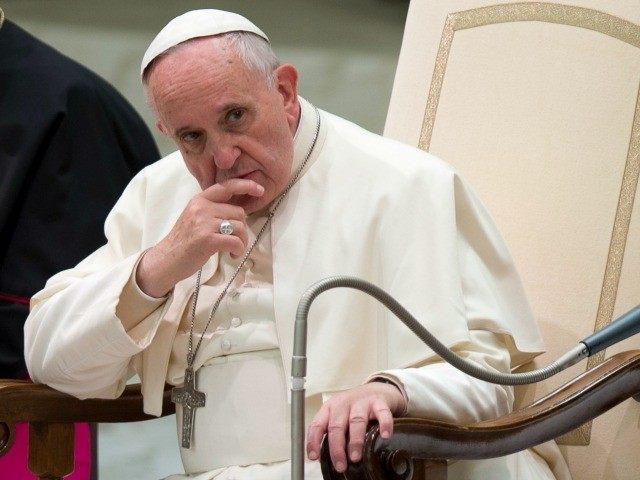This week, Pope Francis will celebrate the second anniversary of his election to the papacy, marked by a notable cooling in the Left’s embrace of a man they had hoped would bring revolutionary change to the Catholic Church.
The New York Times has chosen to commemorate the occasion with an article by Elisabetta Povoledo titled “Women See Themselves as Left Out Amid Talk of Change in Catholic Church.”
Povoledo sets up her piece by noting how Pope Francis “stirred great expectations for change among Roman Catholics who believe that the church has not kept pace with the social transformations of secular society.” After the papacies of Saint John Paul II and Benedict XVI, progressives both inside and outside of the Church felt that they finally had their man in Rome.
“Nowhere are those hopes felt more keenly, perhaps, than among women,” says Povoledo, adding that women “say that their voices remain marginalized.”
Povoledo gives a nod to Francis’ own “acknowledgment that women need to play a more incisive role” in the Church and his repeated underscoring of “the importance of women” in the Church’s life, before voicing critics’ complaints that he has proved “strikingly tone-deaf toward the sensitivities and needs of women.”
Reading through the initial paragraphs of Povoledo’s article, one cannot help feeling that there is an underlying issue that is waiting to bubble forth.
And there, finally, in paragraph ten, her real point emerges: women’s ordination.
After Francis “opened the door to discussion of women’s status to growing hopes,” he crushed them by not caving on the question of women priests. And so “any debate on the role of women,” writes Povoledo, “is curtailed by one irremovable premise: There is no place for women priests. Pope Francis has rejected such a change outright.”
“This,” said Tina Beattie, a professor of Catholic studies at the University of Roehampton in London, “is the most sensitive issue in the Vatican, more difficult than so many others because it is fundamental to so many others.”
“We need to make him understand that this is a make-or-break issue for the church,” she added. “It would be an unbearable blow if he left papacy as he found it with regards to women.”
No matter what else he accomplishes, one concludes, if Francis does not change Church teaching regarding the priesthood, he will leave the papacy “as he found it with regards to women.”
If only the Roman Catholic Church would become Episcopalian, The New York Times would welcome it as its own. If only the Church would begin to mirror pop culture and keep “pace with the social transformations of secular society,” rather than challenging it, the Left would bestow its unconditional seal of approval.
Povoledo’s arguments, unfortunately, echo the unimaginative refrains of a stagnant subculture that can only envision women’s authentic progress in terms of traditional male roles and categories.
A more creative thinker, the feminist intellectual Lucetta Scaraffia, co-editor of a monthly insert on women and the church distributed by the Vatican newspaper, L’Osservatore Romano, exhibits a deeper understanding of both Pope Francis and the real situation of women in the Church.
According to Scaraffia, Pope Francis “doesn’t want a simply accommodation of the Church to the modern world.” What he hopes to spark is “a profound internal reflection, a ‘conversion’ that goes back to the origins and takes up the uninterrupted thread of the extraordinary role that Jesus gave to women.”
“Christianity,” says Scaraffia, “must reappropriate its specificity: that of having established for the first time in history an equality between men and women.”
Six months after Pope Francis’ election, in September 2013, the same Elisabetta Povoledo in the same New York Times waxed rhapsodic over this “surprising” pontiff. “Francis,” she wrote then, “is challenging the status quo of the Roman Catholic Church so determinedly” that some now think the Pope may be preparing the ground “for a more fundamental shift in the direction of the church.”
Alas, this was not to happen, and thus disenchantment was bound to follow.
Any pope, no matter how “liberal” he may seem, is essentially conservative, since his job description is to re-proclaim a message that he received and embraced, and of which he is not the master, but the servant. He is not commissioned to invent his own religion, or to announce his own “good news,” but rather the Gospel of Jesus Christ of which he is an unworthy custodian.
The pope is, after all, Catholic.
Follow Thomas D. Williams on Twitter @tdwilliamsrome.

COMMENTS
Please let us know if you're having issues with commenting.